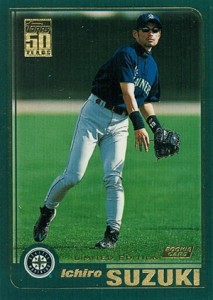
Panini’s “Limited” Trademark Application, May Be Just That — Limited
On June 13, Panini filed a trademark application with the Trademark Office for the mark "Limited," which I think will be difficult for the card maker to get. A summary of Panini's application is below:
| Word Mark | LIMITED |
| Goods and Services | IC 016. US 002 005 022 023 029 037 038 050. G & S: Sports trading cards |
| Standard Characters Claimed | |
| Mark Drawing Code | (4) STANDARD CHARACTER MARK |
| Serial Number | 85650691 |
| Filing Date | June 13, 2012 |
| Current Basis | 1B |
| Original Filing Basis | 1B |
| Owner | (APPLICANT) PANINI AMERICA, INC. CORPORATION DELAWARE 5325 FAA Boulevard, Suite 100 Irving TEXAS 75061 |
| Attorney of Record | Norman H. Zivin |
| Type of Mark | TRADEMARK |
| Register | PRINCIPAL |
| Live/Dead Indicator | LIVE |
Originally, the first sports trading card product called "Limited" was Leaf Limited in 1994. At that time Leaf and Donruss were part of the same family (which later became Playoff and was later acquired by Panini).
Legal disclaimer: The current incarnation of Leaf Trading Co. is not owned by Panini.
In 2009, Panini switched the name from "Leaf Limited" to "Panini Limited," and has been offering trading cards under this name ever since.
Now, despite its history of offering a "Limited" product, and just because it filed for a registration, does not mean Panini will get a trademark registration. To succeed, Panini will need to show that "limited" is a source identifier for Panini.
Legal translation: In other words, when a consumer sees "limited" in association with sports cards, he or she thinks "Panini."
The problem is the term "limited" is often used in the industry by others to describe cards as having a short, finite print run. For example, within 30 seconds of Google searches, I found two Topps webpages that used the word limited (one stated that 2011 Topps Allen & Ginter "will include 200 limited edition autographed cards of President George W. Bush" and another states that its 2011 Topps Magic Rookies Football product is a "limited edition 1 Autograph per pack product."). Heck, if you just search eBay for "Topps limited," you get nearly 3,000 hits.

Not to mention that in 2001, Topps offered its Tiffany-style Limited Edition factory set that use the term "Limited Edition" on the cards themselves.
The word "limited" is an important and often-used descriptive term in the hobby. It has long been a selling point for many sets and manufacturers to emphasize a finite print run.
This is a major hurdle for Panini. A trademark that is merely descriptive will not (or at least should not) receive a registration.
To battle the "merely descriptive" label, Panini will likely need to rely on consumer surveys and an expert or two to show that when people see "limited," they think Panini. But, given the sheer volume of other uses of "limited" in the hobby, I don't see this as a hurdle Panini can surmount.
What might be fun to watch is that given how often the word "limited" is used in the hobby, I would not be surprised if another trading card company files an opposition to this mark. Given that Topps just filed a trademark opposition against Panini already, it might be interesting to see two of these actions going forward at the same time.
So, although Panini has filed an application for control over the word "limited," I think its chances of success are just that -- limited.
The information provided in Paul Lesko's "Law of Cards" column is not intended to be legal advice, but merely conveys general information related to legal issues commonly encountered in the sports industry. This information is not intended to create any legal relationship between Paul Lesko, the Simmons Browder Gianaris Angelides & Barnerd LLC or any attorney and the user. Neither the transmission nor receipt of these website materials will create an attorney-client relationship between the author and the readers.
The views expressed in the "Law of Cards" column are solely those of the author and are not affiliated with the Simmons Law Firm. You should not act or rely on any information in the "Law of Cards" column without seeking the advice of an attorney. The determination of whether you need legal services and your choice of a lawyer are very important matters that should not be based on websites or advertisements.
 | Making purchases through affiliate links can earn the site a commission |
































